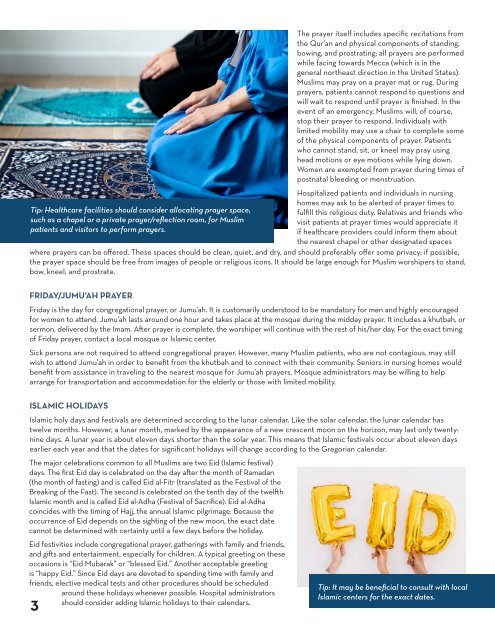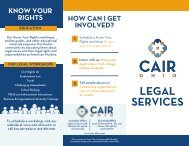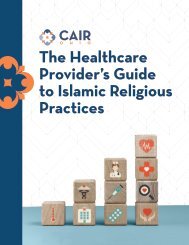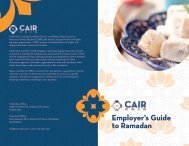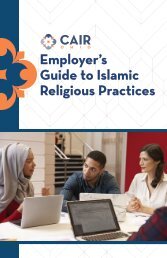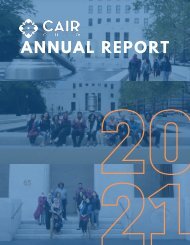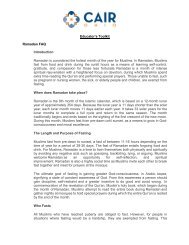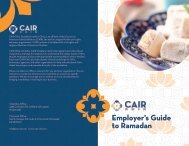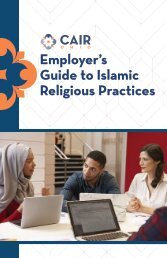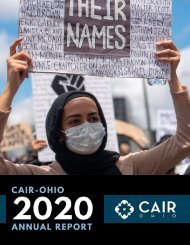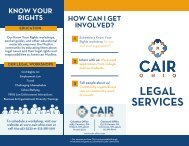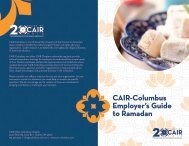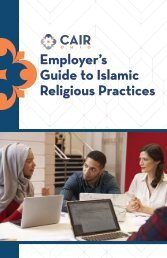CAIR-Ohio-Healthcare-Providers-Guide
You also want an ePaper? Increase the reach of your titles
YUMPU automatically turns print PDFs into web optimized ePapers that Google loves.
Tip: <strong>Healthcare</strong> facilities should consider allocating prayer space,<br />
such as a chapel or a private prayer/reflection room, for Muslim<br />
patients and visitors to perform prayers.<br />
The prayer itself includes specific recitations from<br />
the Qur’an and physical components of standing,<br />
bowing, and prostrating; all prayers are performed<br />
while facing towards Mecca (which is in the<br />
general northeast direction in the United States).<br />
Muslims may pray on a prayer mat or rug. During<br />
prayers, patients cannot respond to questions and<br />
will wait to respond until prayer is finished. In the<br />
event of an emergency, Muslims will, of course,<br />
stop their prayer to respond. Individuals with<br />
limited mobility may use a chair to complete some<br />
of the physical components of prayer. Patients<br />
who cannot stand, sit, or kneel may pray using<br />
head motions or eye motions while lying down.<br />
Women are exempted from prayer during times of<br />
postnatal bleeding or menstruation.<br />
Hospitalized patients and individuals in nursing<br />
homes may ask to be alerted of prayer times to<br />
fulfill this religious duty. Relatives and friends who<br />
visit patients at prayer times would appreciate it<br />
if healthcare providers could inform them about<br />
the nearest chapel or other designated spaces<br />
where prayers can be offered. These spaces should be clean, quiet, and dry, and should preferably offer some privacy; if possible,<br />
the prayer space should be free from images of people or religious icons. It should be large enough for Muslim worshipers to stand,<br />
bow, kneel, and prostrate.<br />
FRIDAY/JUMU’AH PRAYER<br />
Friday is the day for congregational prayer, or Jumu’ah. It is customarily understood to be mandatory for men and highly encouraged<br />
for women to attend. Jumu’ah lasts around one hour and takes place at the mosque during the midday prayer. It includes a khutbah, or<br />
sermon, delivered by the Imam. After prayer is complete, the worshiper will continue with the rest of his/her day. For the exact timing<br />
of Friday prayer, contact a local mosque or Islamic center.<br />
Sick persons are not required to attend congregational prayer. However, many Muslim patients, who are not contagious, may still<br />
wish to attend Jumu’ah in order to benefit from the khutbah and to connect with their community. Seniors in nursing homes would<br />
benefit from assistance in traveling to the nearest mosque for Jumu’ah prayers. Mosque administrators may be willing to help<br />
arrange for transportation and accommodation for the elderly or those with limited mobility.<br />
ISLAMIC HOLIDAYS<br />
Islamic holy days and festivals are determined according to the lunar calendar. Like the solar calendar, the lunar calendar has<br />
twelve months. However, a lunar month, marked by the appearance of a new crescent moon on the horizon, may last only twentynine<br />
days. A lunar year is about eleven days shorter than the solar year. This means that Islamic festivals occur about eleven days<br />
earlier each year and that the dates for significant holidays will change according to the Gregorian calendar.<br />
The major celebrations common to all Muslims are two Eid (Islamic festival)<br />
days. The first Eid day is celebrated on the day after the month of Ramadan<br />
(the month of fasting) and is called Eid al-Fitr (translated as the Festival of the<br />
Breaking of the Fast). The second is celebrated on the tenth day of the twelfth<br />
Islamic month and is called Eid al-Adha (Festival of Sacrifice). Eid al-Adha<br />
coincides with the timing of Hajj, the annual Islamic pilgrimage. Because the<br />
occurrence of Eid depends on the sighting of the new moon, the exact date<br />
cannot be determined with certainty until a few days before the holiday.<br />
Eid festivities include congregational prayer, gatherings with family and friends,<br />
and gifts and entertainment, especially for children. A typical greeting on these<br />
occasions is “Eid Mubarak” or “blessed Eid.” Another acceptable greeting<br />
is “happy Eid.” Since Eid days are devoted to spending time with family and<br />
friends, elective medical tests and other procedures should be scheduled<br />
around these holidays whenever possible. Hospital administrators<br />
should consider adding Islamic holidays to their calendars.<br />
3<br />
Tip: It may be beneficial to consult with local<br />
Islamic centers for the exact dates.


